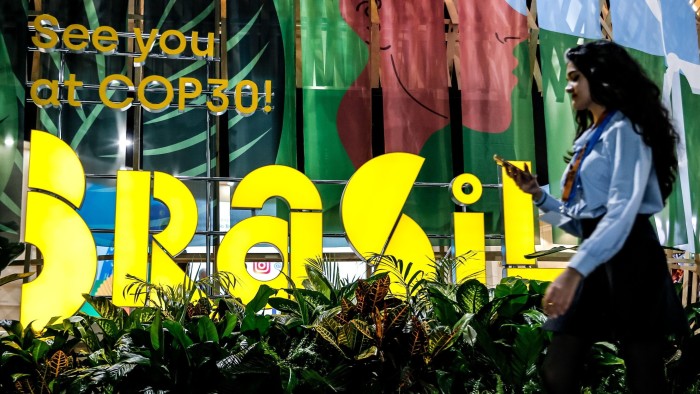Unlock the Editor’s Digest for free
Roula Khalaf, Editor of the FT, selects her favourite stories in this weekly newsletter.
Sir Tony Blair’s consultancy offered to advise Brazil’s COP30 climate summit but was knocked back, before the former UK prime minister this week dismissed the UN climate negotiations as lacking the “heft to drive action and impact”.
Blair has caused a political storm in Britain by calling for a reset of the “irrational” debate over net zero policies, as he warned that voters were being asked to make too many “financial sacrifices” and criticised the COP process.
The comments came in a foreword to a report from his Tony Blair Institute, which previously worked closely with both the United Arab Emirates and Azerbaijan, the hosts of COP28 and COP29 summits, respectively, moves that courted controversy. Blair himself was present at both events.
TBI, which Blair established in 2016, met Brazilian officials earlier this year offering to provide support as the Latin American country gears up to host the world’s most important climate negotiations in Belém in November, according to three people familiar with the discussions. The talks did not progress any further, the people said.
The COP30 presidency said it was “currently not working with or being advised by the Tony Blair Institute”.
A spokesperson for TBI confirmed it had “met with representatives of the government of Brazil to discuss our climate work and how our efforts can help make COP30 a success” but disputed the Financial Times’ “characterisation” of the discussions, without elaborating.
They added that the offer to advise Brazil on COP was on an unpaid basis, as it had been with the UAE, though they said it had been paid for its work with Azerbaijan last year.
Blair’s foreword to the TBI report called for governments to change course on tackling climate change and said the “COP process will not deliver change at the speed required”.
The former UK leader called the summit “a forum that frankly doesn’t have the heft to drive action and impact”, adding: “The great gathering of all the nations has its place though probably not every year.”
“The reality is that it is the decisions of the large countries, and the policy direction they give towards the technology and the financial flows, which can in truth solve the climate issue,” Blair said.
The comments would be viewed as “deeply unhelpful” by Brazil, said a COP veteran who has been involved in past climate negotiations and advises ministers from various countries.
He added that TBI “would have been more careful [in what they wrote] if they had been working with Brazil”.
UK Prime Minister Keir Starmer was this week forced to defend his government’s net zero target, under which the country seeks to produce no net carbon emissions by 2050. Blair’s comments were widely seen as tacit criticism of the Labour party he once led, and in particular energy secretary Ed Miliband.
The TBI later said it was supportive of the Starmer government’s approach and the wider net zero goals.
In a statement to the FT on Thursday the TBI defended the report, arguing that fossil fuel demand has risen “these past twenty years” and that “airline travel is set to double”.
“Therefore a policy based on assuming both facts don’t exist is one unlikely to succeed,” the TBI said. “Climate change is a serious challenge, one of the biggest facing the world, but it needs policies to combat it which start from reality.”
It added that the paper was not written “because Mr Blair has worked with oil-producing nations that hosted COP or because he worked on the gas pipeline for Azerbaijan gas to come to Europe”.

Brazil faces an uphill challenge hosting this year’s COP following the election of Donald Trump in the US, which has sparked fears of green policies being reversed around the world.
Brazil has embarked on a diplomatic frenzy ahead of the summit, with President Luiz Inácio Lula da Silva last week saying it wants COP30 to be “a major collective effort to deliver on climate commitments” and that the “planet is tired of unfulfilled promises.”
One person close to the TBI said they were still hopeful the non-profit organisation — which employs close to 1,000 staff globally — could still win an advisory role with Brazil ahead of COP30.
People close to the Brazilian government said this was unlikely.
“Brazil has a very, very large and professional foreign service, in a way that the UAE and Azerbaijan do not,” said the COP veteran.
Blair’s involvement with COP advisory work has long stoked controversy. He was a keen backer of the UAE’s COP president, Sultan al-Jaber, whose dual role as head of the UAE’s state energy companies unsettled climate campaigners.
The former prime minister’s work with the Azerbaijani government also came under scrutiny given his ties to strongman ruler Ilham Aliyev, who has run the country since 2003 and has faced allegations of “ethnic cleansing” following its seizure of the disputed Nagorno-Karabakh enclave.
Blair’s previous for-profit consultancy, Tony Blair Associates, which shut down in 2016, had lobbied on behalf of the Trans Adriatic Pipeline to bring Azerbaijani gas to Europe.
The spokesperson for TBI defended Blair’s work, arguing that “if the gas pipeline from Azerbaijan had not been built the answer would not have been that Europe didn’t buy gas, but that it would have become even more reliant on Russian gas”.
Climate Capital

Where climate change meets business, markets and politics. Explore the FT’s coverage here.
Are you curious about the FT’s environmental sustainability commitments? Find out more about our science-based targets here




